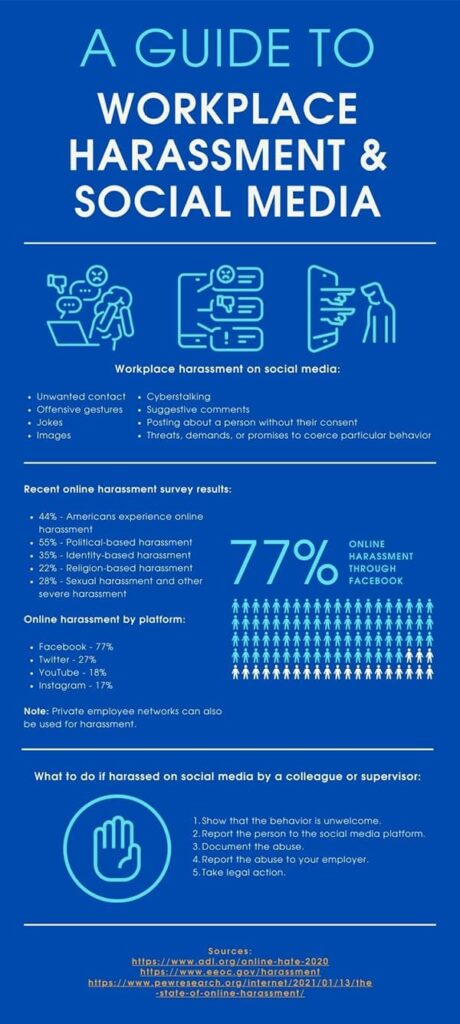Workplace Harassment and Social Media: What You Need to Know

Social media has changed the way we communicate with people. It’s now easier than ever before to connect with others no matter their location. While it has proven to be a powerful tool for both communication and entertainment, it does present new challenges in the workplace. Harassment can happen via these online platforms, which can create a toxic environment and workplace issues.
Whether you’re an employer or an employee, knowing what the law says about workplace harassment and social media is important. Our employment dispute law attorneys explain.

What is considered workplace harassment?
In general, workplace harassment occurs when an employee feels threatened or uncomfortable due to unwelcome conduct, behavior, or comments. According to the Equal Employment Opportunity Commission (EEOC), workplace harassment can come in many forms, including:
- Offensive jokes
- Slurs
- Epithets
- Name-calling
- Physical assault or threats
- Intimidation
- Ridicule or mockery
- Insults
- Offensive objects or pictures
- Interference with work performance
Can social media posts be considered workplace harassment?
Yes. When social media posts cross the line and contain offensive messages that contribute to a hostile work environment or cause an employee to feel threatened, it can be considered online harassment. Just because employees are not in the physical workplace location or on the clock, it doesn’t mean they can say anything they want to other employees.
According to state and federal laws, discriminatory or sexual comments to a colleague online or in the workplace can still be considered workplace harassment.
What is workplace sexual harassment on social media?
Sexual harassment on social media in a workplace context is unwanted behavior of a sexual nature or behavior targeted against a person based on sex. It may be quid pro quo activity that includes demanding actions or favors from someone with promises of beneficial treatment or threats of penalties.
In addition, it can also be behavior that creates a pervasively hostile work environment. Social media can be used to perpetrate sexual harassment in a workplace context if individuals who work together in a professional setting, such as coworkers or supervisors and subordinates, interact using social media.
What qualifies as harassment on social media?
Some examples of workplace harassment using social media may include:
- Unwanted contact between parties
- Offensive gestures
- Suggestive comments
- Images
- Cyberstalking
- Jokes
- Posting about a person without their consent
- Threats, demands, or promises to coerce particular behavior or actions
Workplace harassment using social media can occur on third-party social networks like Facebook, Instagram, and LinkedIn. However, the employer may also have private networks that employees use to interact. Any of these channels may be grounds for harassment via social media.
What are the 3 forms of workplace harassment using social media?
There are three common types of workplace harassment that occur through social media, including:
1. Offensive Messages
One type of virtual harassment happens when an employee sends offensive messages to a coworker. These messages can be sexual or discriminatory in nature or involve online bullying. However, there can also be unwanted communication in the form of repeatedly asking a coworker on dates or inappropriate comments on posts, images, or videos.
2. Inappropriate Images
Another form of workplace harassment that can happen via social media is sending images of a sexual nature to coworkers or employees. Inappropriate images may be unwanted pictures of body parts, pornographic content, or sexualized images.
These images don’t have to be sent directly to you to be considered sexual harassment. As an employee, you have the right to work in an environment that is free of offensive images. If you are exposed to these images, including on social media, you may be able to file a sexual harassment complaint with your employer.
3. Cyberstalking
Cyberstalking occurs when a colleague or supervisor obsessively follows an employee on social media to try to learn:
- Their location
- What they’re doing
- Who they’re with
- Other private details
In some cases, the cyberstalker may even show up at the location where the employee may be. This unwelcome behavior can be considered workplace harassment.
Can an employee be fired for workplace harassment on social media?
Yes, an employee can be disciplined or fired for communications on social media that amount to workplace harassment. Things outside of work hours or outside the premises can contribute to the workplace environment. When employees use social media to engage in harassment, they can be disciplined up to and including termination.
Can social media be used against you at work?
An employer can take action for what you say on social media. In general, private companies can discipline or even fire employees if they share unlawful, offensive, or lewd content through their social media accounts.
However, the exception is that employees can post true statements regarding their workplace conditions. For example, if an employee is being harassed, is forced to work in unsafe conditions, is a victim of child labor, or was denied overtime pay, they should be able to share this on social media.
Can an employer be liable for what an employee posts on social media?

An employer can be liable for employee posts on social media if they fail to protect employees from sexual harassment. An employer must take action if a worker uses social media to engage in harassment that becomes pervasive in the workplace. If the employer doesn’t take appropriate action to respond and root out the harassment, they may be the ones liable.
What can an employer do to prevent workplace harassment through social media?
There are several things that an employer can do to prevent workplace harassment through social media:
- Have a social media policy – Have a clear policy on harassment in the employee handbook. Let employees know, formally and in writing in their employment contract, that harassment can occur on social media and what the consequences are for this behavior.
- Let employees know they can report harassment without retaliation – Workers must be free to report harassment. They need to know that retaliation against people who speak up will not be tolerated.
- Provide sexual harassment training – Help employees understand what sexual harassment is and how it can occur online. This training not only shows the employer taking this conduct seriously but also helps employees identify and avoid inappropriate conduct.
- Respond when complaints arrive – When a person bravely speaks up about harassment at work, the employer has a legal obligation to respond appropriately. They must be prepared to conduct investigations and determine appropriate discipline when they receive reports of workplace harassment on social media.
What should an employee do if they are sexually harassed on social media?
If you’re the victim of virtual sexual harassment by a colleague or supervisor, there are steps you can take to ensure the behavior stops and you get justice. When you can, you should:
- Show that the behavior is unwelcome. Take steps to stop the harassment online, such as muting, blocking, and reporting the harassment through the social media platform
- Document the abuse. Save any inappropriate messages and offensive content and keep them as evidence.
- Report the abuse to your employer. Filing a complaint means the employer should take action against the offender. They must ensure the safety and health of their employees.
- Take legal action. If your employer fails to appropriately respond to your report of workplace harassment, you may be able to bring a legal claim against them. Speak with a personal injury attorney to see if you have a case.
Denver Employment Law Attorney for Workplace Harassment
Have you been the victim of workplace harassment on social media? Let our employment attorneys fight for your rights. We have experience in labor and employment law and represent employees who are victims of workplace harassment. Contact our law firm for legal advice and to schedule a free consultation.
Sources:
U.S. Equal Employment Opportunity Commission (EEOC). Harassment.
Employment Law Help. Inappropriate Sexual Images In the Workplace.
Pew Research Center. (13 January 2021). The State of Online Harassment.
U.S. Department of Labor. Wages and the Fair Labor Standards Act.






